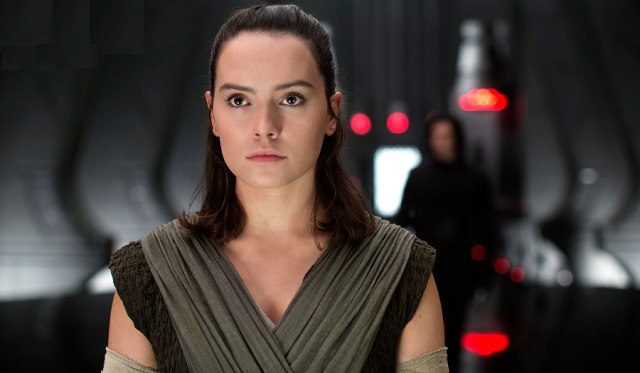Rian Johnson Explains Why the Reveal of Rey’s Parents Was Crucial

Star Wars: The Last Jedi director Rian Johnson is still filling us in on the thought process behind his space opera epic, and it’s clear he spent a lot of time considering the big question of Rey’s parentage.
Johnson was aware that the mystery of Rey’s direct lineage dominated fan discourse immediately following The Force Awakens and in the intervening years. I’ve personally pored over theory articles and watched many, many videos that laid out why Rey was descended from everyone from Obi-Wan Kenobi to Emperor Palpatine.
So it was shocking to many of us—and to Rey herself, who pursued the matter of her parents throughout The Last Jedi—to hear that Rey was just, well, Rey, with no other well-known moniker attached. Her parents were essentially nobodies; as Kylo Ren puts it cruelly and succinctly, “Filthy junk traders. Sold you off for drinking money. They’re dead in a pauper’s grave in the Jakku desert.”
In the latest Empire Film Podcast, Johnson went into more depth about how he came to make one of the bigger, twistier decisions in Star Wars plot history since The Empire Strikes Back. Per Vanity Fair:
“I went through all the possibilities of who her parents could be,” Johnson said. “I made a list, with the upsides and downsides” (a list that was probably promptly destroyed by a harried Lucasfilm intern). He landed where he did because he was fond of “breaking out from the notion that the Force is this genetic thing that you have to be tied to somebody to have. It’s the ‘anybody can be president’ idea, which I liked introducing. The foremost thing, though, was just dramatically, storytelling-wise.”
Johnson explains that for Rey to discover that she’s not secretly the product of some anointed name would be “the hardest thing” and would knock her off-balance:
“The hardest thing to hear is, ‘Nope, this is not gonna define you,’” Johnson added. “And, in fact, Kylo is gonna use this to try and undercut your confidence so you’ll feel you have to lean on him for your identity . . . you’re gonna have to make the choice to find your own identity in this story.”
Laid out like this, the choice for where Rey came from makes a lot of sense—and it comes with a nicely egalitarian message that your last name doesn’t have to be Kenobi or Skywalker in order to be the hero of the story. It also adds an emotional charge, and a vulnerability, that would have been absent if Rey had suddenly found out that she was Han Solo’s long-lost daughter, and Rey eventually overcomes that vulnerability with aplomb.
Kylo Ren tries to wield the disappointment of Rey’s parentage as a weapon to “win her over.” In a tactic that many have pointed out has every hallmark of an abuser, Kylo follows up the “filthy junk traders” line with, “You come from nothing. You‘re nothing, but not to me.” You can see the conflict that his harsh words spark in Rey, but ultimately, she rises above the pain of the revelation about her parents and escapes the snare of Kylo’s attentions. It’s all the more impressive when we consider what Rey has just been confronted with. Rather than let this define her—as she might have leaned on her family history if it turned out Qui-Gon Jinn had secretly fathered her—she makes the choice, as Johnson says, to discover her own identity thereafter.
It’s a considerable break for Star Wars, if we consider that the original trilogy contained possibly the most shocking family reveal in history, but that’s part of what makes Johnson’s choice for Rey so important. It was the last thing that most of us expected, and that narrative fastball helps to define Rey going forward far more than her blood association with a famous figure would have.
I’ll admit that, like many fans, on my first Last Jedi viewing, I was disappointed about this choice for Rey. It’s a mark of just how much we’re conditioned to expect the hero to be from a great family or under the sign of a prophecy—how deeply that idea, stretching back to the most ancient of myths, is still ingrained in our storytelling. By my second viewing, I thought it was rather brilliant, though some questions still remain: If Rey’s parentage was up to Johnson to decide, was there a different plan for her plotted out back in The Force Awakens time? Will we ever get to see that list of potential parents and upsides and downsides? And what would The Last Jedi possibly have looked like if Luke had turned to Rey and been like, “Oh yeah, forgot to mention, I’m your father?”
It’s fun to consider the possibilities, but ultimately, I appreciate that Rian Johnson broke with tradition and gave us a hero for a new Star Wars age, someone immensely powerful and capable who came from “nothing.” That’s always an important message to hear, and we get it emphasized by the last shot in The Last Jedi, which shows a lowly stable boy using the Force. In fact, another important takeaway from The Last Jedi is that descending from a storied line can fill you with hubris and authoritarian rage, and a famous last name doesn’t prevent you from being the actual worst.
You can listen to Johnson on the Empire Film podcast below:
(via Vanity Fair, images: Disney/Lucasfilm)
Want more stories like this? Become a subscriber and support the site!
—The Mary Sue has a strict comment policy that forbids, but is not limited to, personal insults toward anyone, hate speech, and trolling.—
Have a tip we should know? tips@themarysue.com